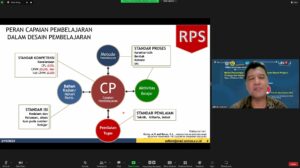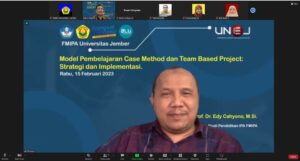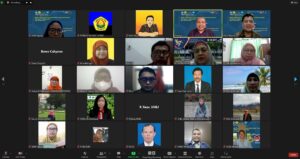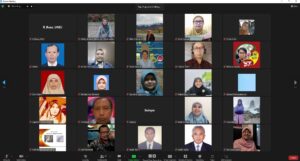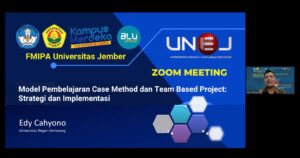 “The achievements that we will achieve in this discussion include RPS applying the Case Method and or Team Based Project,” Prof. started. Dr. Edy Cahyono, M.Si. from Semarang State University. In addition to the RPS, the CPMK and sub-CPMK formulations, learning plans, and assessment according to learning outcomes are the core of the strategy and implementation of the Case Method and Team Based Project. Everything was revealed by the Professor who is also the Coordinator of the Science Education Study Program at FMIPA UNNES when delivering material to FMIPA lecturers online (15/2).
“The achievements that we will achieve in this discussion include RPS applying the Case Method and or Team Based Project,” Prof. started. Dr. Edy Cahyono, M.Si. from Semarang State University. In addition to the RPS, the CPMK and sub-CPMK formulations, learning plans, and assessment according to learning outcomes are the core of the strategy and implementation of the Case Method and Team Based Project. Everything was revealed by the Professor who is also the Coordinator of the Science Education Study Program at FMIPA UNNES when delivering material to FMIPA lecturers online (15/2).
Prof. Edy also conveyed the role of learning outcomes in learning design. “It is necessary to pay attention to competency standards for learning outcomes, even with content standards for study materials supported by learning methods and learning activities according to standards as well as to produce assessment standards for a task,” he explained. For learning methods according to IKU point 7 in Kepmendikbud No. 3 of 2021. “In IKU point 7, Case Method and Team Based Project refer to RPS, implementation, namely the role of students to assessment and evaluation,” he continued.
Previously Vice Dean I FMIPA UNEJ Drs. Siswoyo, M.Sc., Ph.D. as the moderator said that this agenda was also a reference for lecturers at FMIPA who were filling out the RPS systemically. “Hopefully with the speaker Prof. Edy can enlighten the FMIPA lecturers who are currently filling out the RPS in a systematic way at UNEJ,” he hoped. Vice Dean I of FMIPA said that the Case Method and Team Based Project learning models were very useful to support teaching and learning activities at FMIPA.
In Project Based Learning delivered by Prof. Edy there are several characteristics that need to be understood. “Moving questions, learning objectives, scientific experience, collaboration, technology and product results are characteristics of Project Based Learning,” he explained. Furthermore, it will lead to team-based learning in which there is project preparation (identification and formulation of problems as well as project design), project implementation (inquiry and monitoring) and finally exposure (presentation of results, assessment and evaluation).
Prof. Edy also reviewed Case Mehod which is a form of active teaching that focuses on a case and involves students learning to learn independently. “The case can be a real or fictional story that includes an educational message or retold event, a problem, a dilemma, a theoretical or conceptual problem that requires analysis and/or decision making.” he explained. At the end of the event, participants were given the opportunity to ask questions to the speaker.

